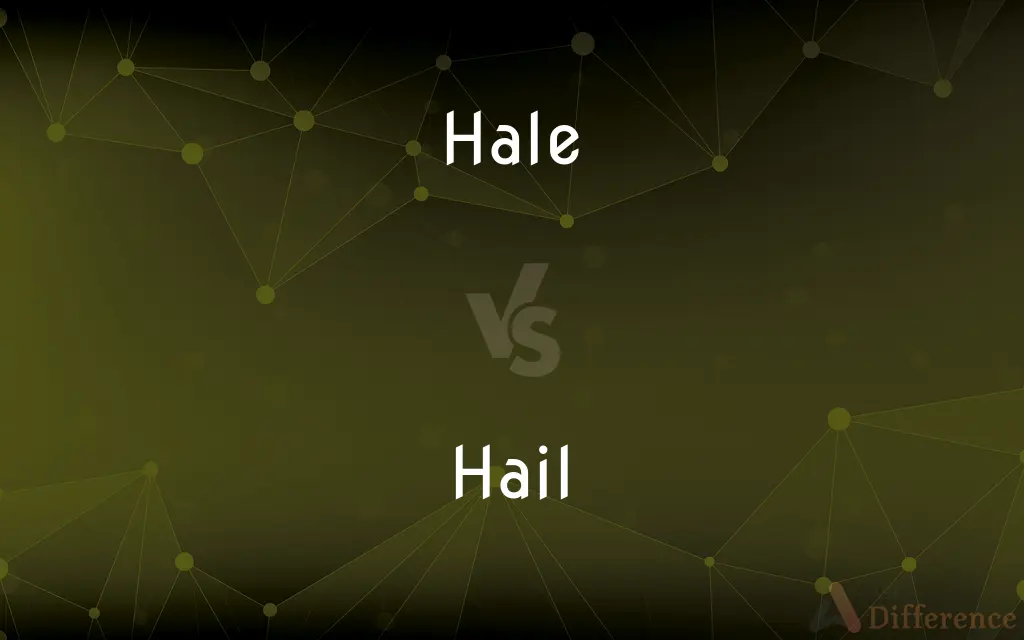Hale vs. Hail — What's the Difference?
By Tayyaba Rehman — Updated on October 3, 2023
"Hale" means healthy and free from ailment, while "Hail" can either be a form of precipitation with balls of ice or a verb to greet or signal. Both words are distinct in usage and meaning.

Difference Between Hale and Hail
Table of Contents
ADVERTISEMENT
Key Differences
"Hale" generally denotes a state of robust health and wellness, embodying vitality and a lack of infirmity, which is chiefly used as an adjective to describe individuals, especially those of older age, who are notably vigorous and hearty. Contrarily, "Hail" possesses multifaceted applications, serving as both a noun to describe a specific type of precipitation involving balls or lumps of ice and as a verb signifying the act of enthusiastically greeting or calling attention to someone or something.
In specific instances, "Hale" reflects not merely physical health but a commendable, resilient vitality that surpasses mere absence of disease, often attributing to a person a certain vigor despite advancing age. On the other spectrum, "Hail," when employed as a noun, specifically refers to a weather phenomenon where frozen pellets descend from the sky, often causing damage due to their hardness and, occasionally, significant size.
When utilizing "Hale" in speech or writing, it usually implies a hearty robustness and a somewhat impressive state of health, often used to describe elderly individuals who maintain a vigorous and healthy demeanor despite their years. Alternatively, "Hail" in its verbal form is indicative of a friendly gesture of recognition or a call to attract attention, often used in various scenarios whether on land, when hailing a taxi, or at sea, when hailing another vessel.
"Hale" in linguistic applications predominantly emerges in scenarios where health and vitality are being emphasized, such as providing descriptions in literature or during conversational compliments regarding someone’s physical state. In stark contrast, "Hail" used as a verb finds its presence in multiple contexts, often indicating a gesture or call of recognition, salutation, or a means to draw attention, thereby serving functional and interactive purposes in communication.
While "Hale" and "Hail" present stark disparities in meaning and application, a grasp of their distinctive uses aids in navigating through various communicative scenarios, whether describing the hearty vitality of an individual or discussing weather phenomena and interpersonal interactions involving greetings and calls for attention. Understanding these distinctions not only enhances lexical knowledge but also enriches expressive capability in various communicative contexts.
ADVERTISEMENT
Comparison Chart
Part of Speech
Adjective
Noun/Verb
Basic Meaning
Healthy and robust, especially of elderly people.
Precipitation of ice balls/To greet or signal someone.
Usage in Sentence
Rarely used in contemporary casual conversation.
Widely used in various contexts and conversations.
Application Domain
Descriptive of health status, often in literature.
Weather phenomena and interpersonal communication.
Synonym
Hardy
Ice pellets/Salute, Acclaim
Compare with Definitions
Hale
Exhibiting well-being and robust health.
His hale complexion was a sign of good health.
Hail
Precipitation in the form of small balls or lumps of ice.
The plants were damaged by the sudden hail.
Hale
Healthy and vigorous.
The hale old man goes for a jog every morning.
Hail
To call out to in order to catch the attention of.
I tried to hail a taxi in the busy city.
Hale
Free from disease or infirmity.
Despite her age, she remains hale and hearty.
Hail
To acclaim or praise enthusiastically.
The crowd began to hail the victorious team.
Hale
Reflecting a sound and lively health.
The doctor was surprised by the patient’s hale condition.
Hail
To signal or summon by calling.
She had to hail her friends across the noisy room.
Hale
Free from infirmity or illness; sound.
Hail
Hail is a form of solid precipitation. It is distinct from ice pellets (American English "sleet"), though the two are often confused.
Hale
To compel to go
"In short order the human rights campaign was haled before a high court of indignation" (Arthur M. Schlesinger, Jr.).
Hail
Precipitation in the form of spherical or irregular pellets of ice larger than 5 millimeters (0.2 inch) in diameter, usually associated with thunderstorms.
Hale
(Archaic) To pull, draw, drag, or hoist.
Hail
Something that falls with the force and quantity of a shower of ice and hard snow
A hail of pebbles.
A hail of criticism.
Hale
(dated) Sound, entire, healthy; robust, not impaired.
Hail
The act of greeting or acclaiming.
Hale
(archaic) Health, welfare.
Hail
A shout made to catch someone's attention or to greet.
Hale
To drag or pull, especially forcibly.
Hail
Hailing distance
Told me to stay within hail.
Hale
Sound; entire; healthy; robust; not impaired; as, a hale body.
Last year we thought him strong and hale.
Hail
To precipitate in pellets of ice and hard snow.
Hale
Welfare.
All heedless of his dearest hale.
Hail
To fall like hailstones
Condemnations hailed down on them.
Hale
To pull; to drag; to haul.
Easier both to freight, and to hale ashore.
As some dark priest hales the reluctant victim.
Hail
To pour (something) down or forth
They hailed insults at me.
Hale
A soldier of the American Revolution who was hanged as a spy by the British; his last words were supposed to have been `I only regret that I have but one life to give for my country' (1755-1776)
Hail
To salute or greet.
Hale
United States astronomer who discovered that sunspots are associated with strong magnetic fields (1868-1938)
Hail
To greet or acclaim enthusiastically
The crowds hailed the boxing champion.
Hale
Prolific United States writer (1822-1909)
Hail
To call out or yell in order to catch the attention of
Hail a cabdriver.
Hale
To cause to do through pressure or necessity, by physical, moral or intellectual means :
She forced him to take a job in the city
He squeezed her for information
Hail
To signal or call to a passing ship as a greeting or identification.
Hale
Draw slowly or heavily;
Haul stones
Haul nets
Hail
Used to express a greeting or tribute.
Hale
Exhibiting or restored to vigorous good health;
Hale and hearty
Whole in mind and body
A whole person again
Hail
S or pieces of ice falling as precipitation, often in connection with a thunderstorm.
Hale
Strong and substantial in physical condition.
The hale athlete competed well into his forties.
Hail
An occurrence of this type of precipitation; a hailstorm.
Hail
A rapid, intense barrage by a large number of projectiles or other objects.
Hail
(impersonal) Of hail, to fall from the sky.
They say it's going to hail tomorrow.
Hail
(intransitive) To send or release hail.
The cloud would hail down furiously within a few minutes.
Hail
To pour down in rapid succession.
Hail
(transitive) To greet; give salutation to; salute.
Hail
(transitive) To name; to designate; to call.
He was hailed as a hero.
Hail
(transitive) To call out loudly in order to gain the attention of.
Hail a taxi.
Hail
To indicate, from a designated stop or otherwise, to the driver of a public transport vehicle that one wishes to board and travel on the vehicle, usually using hand signals such as waving.
In Melbourne, you would usually have to hail a tram when you are travelling late at night and there are no other passengers waiting at your stop.
Hail
(transitive) To signal in order to initiate communication with.
Hail
(obsolete) Healthy, whole, safe.
Hail
An exclamation of respectful or reverent salutation, or, occasionally, of familiar greeting.
Hail
Small roundish masses of ice precipitated from the clouds, where they are formed by the congelation of vapor. The separate masses or grains are called hailstones.
Thunder mixed with hail,Hail mixed with fire, must rend the Egyptian sky.
Hail
A wish of health; a salutation; a loud call.
The angel hail bestowed.
Hail
To pour down particles of ice, or frozen vapors.
Hail
To pour forcibly down, as hail.
Hail
To call loudly to, or after; to accost; to salute; to address.
Hail
To name; to designate; to call.
And such a son as all men hailed me happy.
Hail
To declare, by hailing, the port from which a vessel sails or where she is registered; hence, to sail; to come; - used with from; as, the steamer hails from New York.
Hail
To report as one's home or the place from whence one comes; to come; - with from.
Hail
Healthy. See Hale (the preferable spelling).
Hail
An exclamation of respectful or reverent salutation, or, occasionally, of familiar greeting.
Hail
Precipitation of ice pellets when there are strong rising air currents
Hail
Enthusiastic greeting
Hail
Praise vociferously;
The critics hailed the young pianist as a new Rubinstein
Hail
Be a native of;
She hails from Kalamazoo
Hail
Call for;
Hail a cab
Hail
Greet enthusiastically or joyfully
Hail
Precipitate as small ice particles;
It hailed for an hour
Common Curiosities
Are "Hale" and "Hail" interchangeable in any context?
No, "Hale" and "Hail" have distinct meanings and are not interchangeable.
Can "Hale" be used to describe someone young?
Yes, while it’s often used for the elderly, "Hale" can describe anyone healthy.
Does "Hail" always refer to weather phenomena?
No, "Hail" can also mean to greet or to call out to attract attention.
Can "Hail" be used to describe other forms of precipitation?
Typically, no. "Hail" specifically refers to precipitation of small ice pellets.
Is "Hale" commonly used in everyday language?
"Hale" is less common in casual conversation and is often found in literature.
Share Your Discovery

Previous Comparison
Previous vs. Prior
Next Comparison
Smelt vs. SmelledAuthor Spotlight
Written by
Tayyaba RehmanTayyaba Rehman is a distinguished writer, currently serving as a primary contributor to askdifference.com. As a researcher in semantics and etymology, Tayyaba's passion for the complexity of languages and their distinctions has found a perfect home on the platform. Tayyaba delves into the intricacies of language, distinguishing between commonly confused words and phrases, thereby providing clarity for readers worldwide.













































